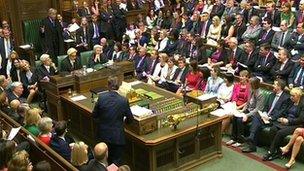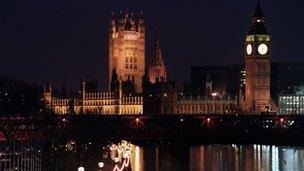Plots, devices and stratagems
- Published
- comments
Summer time, and the plotting is easy. The phones of the politterati will be glowing red hot, with everything from full-on leadership plotting to legislative scheming.
And there's even plenty of jockeying for position on the committee corridor.
I'll do a more detailed preview of events closer to the return of honourable members and noble lords - but I thought it was worth flagging up some of what is going on.

When MPs return in September, they'll be straight back into very serious politics with the report and third reading stages, external of the EU Referendum Bill. You'll remember that the government defused a backbench rebellion on this measure over the rules for "purdah" (restrictions on government activities in the run-up to a vote) by promising new amendments to meet the concerns of potential rebels.
One straw in the wind is the letter from the Public Administration and Constitutional Affairs Committee (prop. uber-sceptic Bernard Jenkin) to the Europe Minister, David Lidington.
The letter says it's the committee's view that section 125 - which regulates the purdah period - be restored to the referendum bill and "remain unimpaired by any amendment".
It adds that the legitimacy of the referendum result must be beyond question and that the government's proposal had - albeit unintentionally - "cast a shadow of doubt" over the propriety of the process. So watch out for the publication of those purdah amendments - probably the week before MPs return - and for a blast of fury if the Eurosceptic camp don't think they measure up to the promises. And expect even more fun when the bill lands in the Lords - where the second reading is scheduled for 13 October.
The new Labour leader takes office half way through the September sitting - the election result is due on 12 September. There will need to be some rapid policy decisions on issues like the line to take on the Welfare Reform and Work Bill, where the detailed scrutiny of committee stage will be under way and due to conclude by 15 October, and where Labour has already put down a battery of amendments. Onetime front runner, Andy Burnham, has warned: "I am determined that Labour will fight this regressive bill word by word, line by line."
And the Leader will also have to appoint a new front bench team, which could mean some considerable changes. Will shadow Chancellor Chris Leslie - catapulted into the role with the political demise of Ed Balls - continue, or will he be replaced by, say, Rachel Reeves? Will Jeremy Corbyn be promoted to Labour's top table (assuming he's not the one doing the promoting) and, if so, in what role?
Meanwhile the Lords has resumed its habit of defeating the government - with a couple of stinging rebuffs to ministers, and should have plenty of scope for more across the remainder of 2016.
I doubt the Welfare Reform and Work Bill will be spared the kind of grinding attritional battle that was fought over the 2010 Welfare Reform Act, which saw ministers suffer 11 defeats, and make many more compromises, to stave off further defeats - and that's before we get onto the constitutional stuff like the EU Referendum Bill and English Votes for English laws (EVEL).
The added factor in this parliament is that the still-substantial Liberal Democrat group of peers thirst for revenge against the Conservatives, and will use the Lords to showcase their opposition as well as radical policies to which Labour won't sign up, as on drugs law.
Already the government faces awkward decisions over the Commons response to the Lords vote to set up a joint select committee on EVEL, which, if accepted, could potentially delay their promised rule change well into next year. Ministers may not be keen, but might not be able to win a Commons vote on signing up to that committee, if they opposed it. And if they did manage to rebuff their lordships, they could then pay a price in the Upper House. Because peers take their "guardian of the constitution" role very seriously.
Internal matters
There are also some internal matters to be resolved; the MPs' ethics watchdog the Standards Committee has not yet been reconstituted (although Sir Kevin Barron remains in the chair) - but it does have one very big legacy from the last Parliament in its in-tray: the allegation that various News International panjandrums misled the Culture, Media and Sport Committee over phone hacking.

How to go about the restoration of the palace will occupy the next session of parliament
Sub judice issues linked to a series of court cases had prevented any action on a formal complaint, but the way is now clear for the Standards Committee to look into it. This opens the whole can of worms over Parliament's actual powers to punish anyone for contempt - which are archaic and not human rights compliant; essentially the committee would have to re-try the whole issue. Second, there are rumours that new information has emerged that could clear the people in the firing line of any wrong-doing.
Behind the scenes, the new joint committee on the Palace of Westminster starts work. This is a high-powered gathering of senior figures, including the Leaders of both Houses, charged with deciding how to go about the much-needed restoration and renewal of the iconic Victorian parliamentary buildings. The key question is whether MPs and peers will have to vacate their beloved building for, perhaps, several years, while essential work is done - although that won't happen until July 2020 at the very earliest (unless disaster forces Parliament out, before then). This is hyper-controversial for the parliamentarians, at least.
I'll be back to contemplate all that in September.